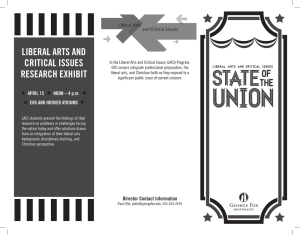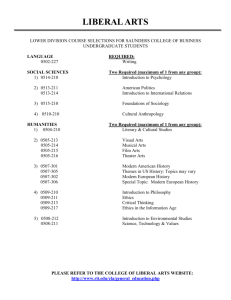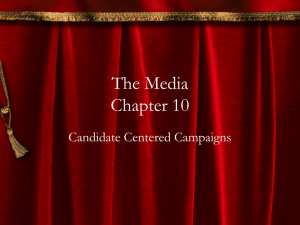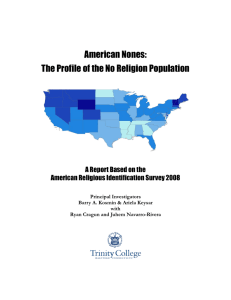State of the Union CRITICAL ISSUES
advertisement
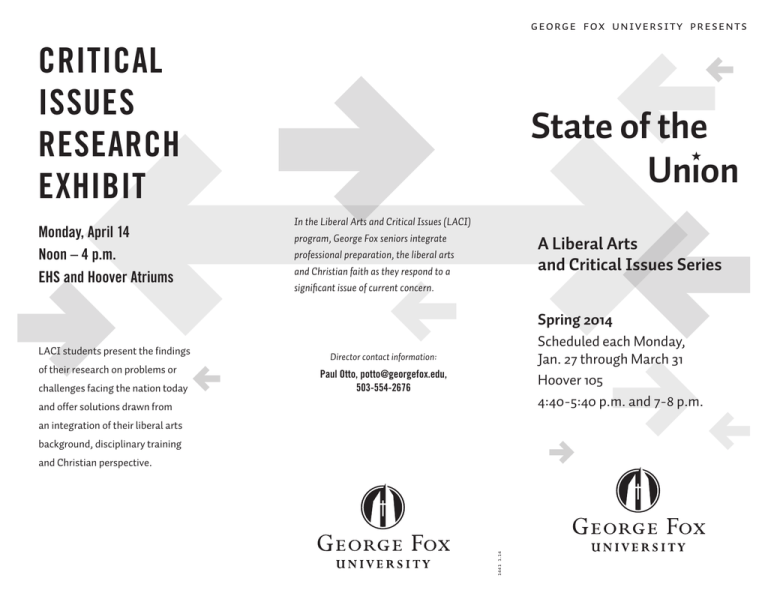
George Fox University presents CRITICAL ISSUES RESEARCH EXHIBIT Monday, April 14 Noon – 4 p.m. EHS and Hoover Atriums State of the Union In the Liberal Arts and Critical Issues (LACI) program, George Fox seniors integrate A Liberal Arts and Critical Issues Series professional preparation, the liberal arts and Christian faith as they respond to a significant issue of current concern. Spring 2014 LACI students present the findings of their research on problems or challenges facing the nation today Scheduled each Monday, Jan. 27 through March 31 Hoover 105 4:40-5:40 p.m. and 7-8 p.m. Director contact information: Paul Otto, potto@georgefox.edu, 503-554-2676 and offer solutions drawn from an integration of their liberal arts background, disciplinary training 1441 1.14 and Christian perspective. State of the union: A Liberal Arts and Critical Issues Series | spring 2014 Why Can’t We Talk to Each Other? · · · · · · · · · · · · Jan. 27 Will College Sports Turn Pro?· · · · · · · · · · · · · · · · · · · · Feb. 17 Spaces Where Learners Flourish · · · · · · · · · · · · · · · · · · · March 10 Steve Sherwood Assistant Professor for Youth Evangelism and Discipleship, George Fox University Murray Sperber Visiting Professor, Graduate School of Education, UC Berkeley Elaine Brouwer Director, Alta Vista Institute In politics, churches, on Internet message boards, and beyond, Americans increasingly yell past each other, rather than talking with each other. Why is this? What can be done about it? What is a Christian vision of discourse in America? Human Trafficking: Modern Day Slavery in America · · · · · · · · · · · · · · Feb. 3 Amanda Marshall United States Attorney, District of Oregon Speaking from her experience as U.S. Attorney, Amanda Marshall will discuss the plague of human trafficking from an international, national and local perspective, including recent research and responses to child sex trafficking in Oregon. Christians and Same-Sex Marriage: Framing the Questions before Shouting Out the Answers· · · · · · · · · Feb. 10 Julia Stronks Edward B. Lindaman Chair, Political Science, Whitworth University Fifteen states now legalize same-sex marriage. Should Christians be concerned about this or should Christians think about this as civil rights for the LGBTQ community? Your answer to this question depends only partly on how you view homosexuality. The current model of intercollegiate athletics is under siege: former college players are in court attacking the NCAA’s rules on amateurism; some conference commissioners suggest monetary compensation for current athletes; many media commentators call for the immediate professionalization of college sports. Change seems inevitable, but how soon and to what extent? And what will happen to all the schools in NCAA Division III? Toxic Chemicals in Everyday Life · · · · · · · · · · · · · · Feb. 24 Jen Coleman, Outreach Director, Oregon Environmental Council A wide range of toxic chemicals are measurable in the bodies of 97% of the U.S. population. Who is responsible for creating this chemical burden, and who pays the price? Jen will discuss the current state of health science and policy initiative related to toxic chemical management. Believe It or Not: The Rise of the Nones and the Future of Religion in the United States· · · · · · · · · · · · March 3 David Gutterman Associate Professor of Politics, Willamette University Over the last 20 years there has been a dramatic rise in the percentage of religiously unaffiliated citizens in the United States. In this lecture, David Gutterman will discuss who the “Nones” are, what they believe, and what the rise of the “Nones” suggests about the future of religion and politics in the United States. This presentation will explore the sorts of “spaces” that provide particularly favorable environments in which learners can thrive in the present and in a future we cannot see. Capitalism and Selling Sickness in the USA · · · · · · · · · · · · · March 17 Kent Thornburg M. Lowell Edwards Professor of Cardiovascular Medicine, Oregon Health & Science University Kent Thornburg will discuss how Americans have come to rely on free market products for their nutrition, how food is designed to be highly palatable, how the food that we eat is making us less healthy, and how poor health today will be passed on to future generations through epigenetic mechanisms. Religious Culture as a Political Strategy· · · · · · · · · · · March 31 Stacy Keogh Assistant Professor of Sociology, Whitworth University Religion and politics both address issues that are deep-seeded in ethical beliefs, which is why we often see the influence of religious ideologies in voting behaviors. This lecture digs deeper into that relationship and examines how social and political movements of the past and present have used the religious “cultural toolkit” as a strategy for mobilization.
